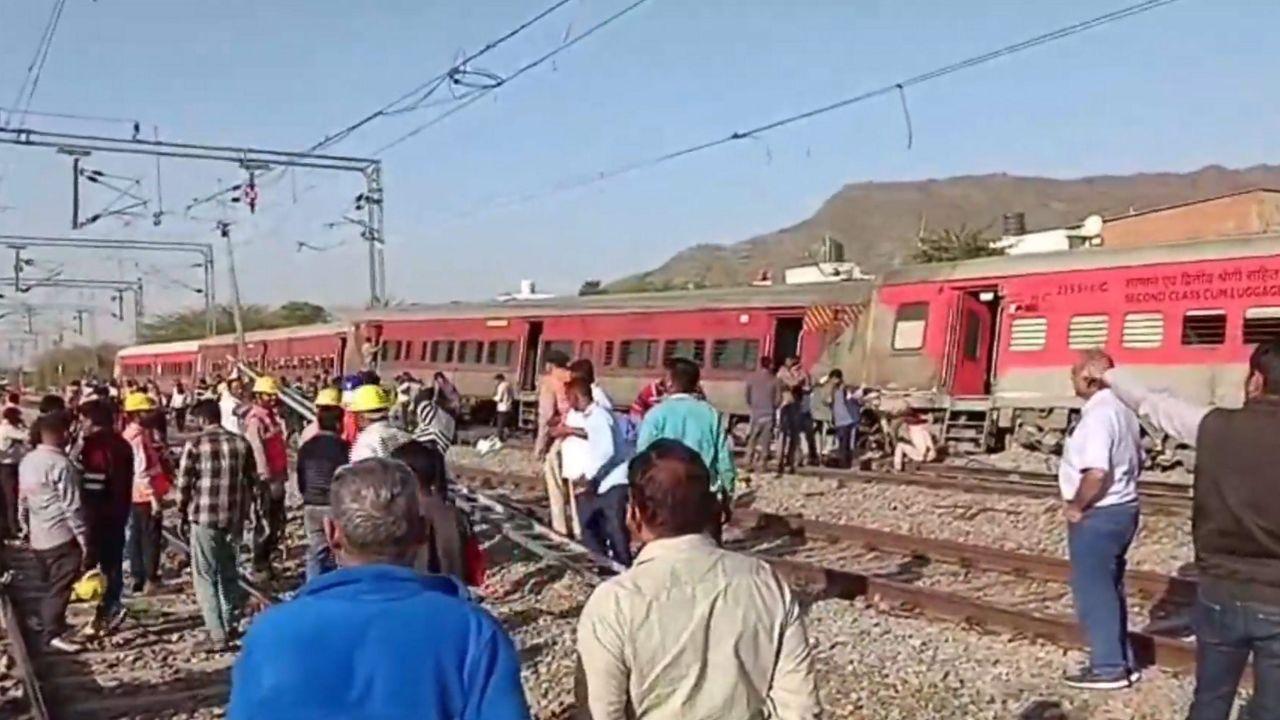Four coaches of Sabarmati-Agra express, which was on its way to Agra, derailed near the Ajmer station on Monday. No loss of life was reported in the incident.

Four coaches of Sabarmati-Agra express derailed near Ajmer station/ PTI
A preliminary probe into the derailment of the Sabarmati-Agra Superfast Express near Ajmer has revealed that the loco pilot overshot the red signal after which it collided with two rear wagons of a freight train.
ADVERTISEMENT
Four coaches of the passenger train, which was on its way to Agra, derailed near the Ajmer station on Monday. No loss of life was reported in the incident.
The joint probe report, signed by seven experts, said that train number 12458 (Sabarmati-Agra Superfast Express) departed from Ajmer at 00:50 and while approaching Madar station, the driver overshot the red signal and the train collided with two rear wagons of a freight train which was passing through at an intersection/crossover.
Due to this, four coaches of the train and its engine derailed causing a huge disruption to the train operations in both up/down directions for several hours. The report said that no casualty or injuries were caused by the incident, though the train's speed at the time of collision was 50 km per hour.
The loco pilot too admitted in his submission that before entering the Madar station, he saw the first signal in the double yellow position and the second in single yellow.
The driver further said that when he saw the third signal in the red position, he applied an emergency brake but by the time, the train collided with the rear end of the freight train.
According to experts, a driver, as per the norm, has to apply brakes when he gets the first signal in double yellow position as the train takes time to stop after covering about 500 to 600-metre distance due to its momentum.
"The first signal in the double yellow position is an indication to the driver that he has to apply the brake as there is an obstruction on the track ahead. In such a situation, the next signal is kept yellow and the third one is red," a retired loco pilot said.
He added, "The driver in his version to the joint report committee has admitted that he saw the first signal in double yellow position. But he hasn't specified why he didn't apply the brake then."
Loco pilots said that overshooting a red signal (also called Signal Passed At Danger or SPAD) occurs when drivers lose focus and indulge in other activities
"Sometimes drivers doze off too due to fatigue and SPAD occurs. There are cases in which mental stress or family issues bog their mind so much that they miss signals," a loco pilot said, requesting anonymity.
"Though the assistant loco pilot's job is to alert the loco pilot about all these things but sometimes despite that, SPAD happens when drivers go absent-minded," he added.
The SPAD report in this case suggests that the driver was living alone away from his family.
This story has been sourced from a third party syndicated feed, agencies. Mid-day accepts no responsibility or liability for its dependability, trustworthiness, reliability and data of the text. Mid-day management/mid-day.com reserves the sole right to alter, delete or remove (without notice) the content in its absolute discretion for any reason whatsoever.
 Subscribe today by clicking the link and stay updated with the latest news!" Click here!
Subscribe today by clicking the link and stay updated with the latest news!" Click here!







